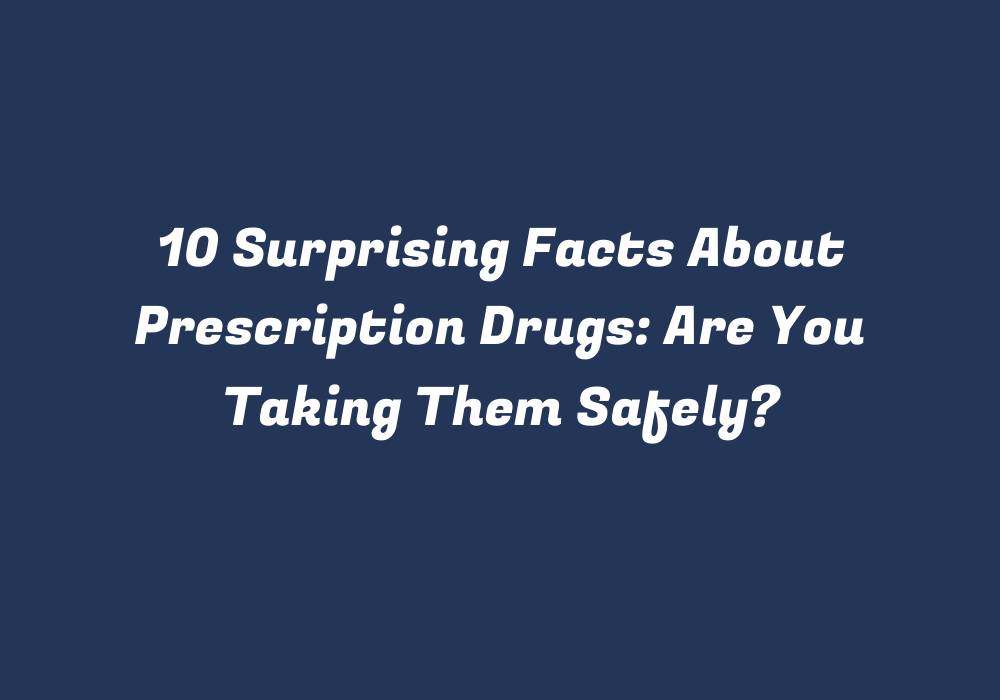10 Surprising Facts About Prescription Drugs: Are You Taking Them Safely?
Introduction: Prescription drugs play a significant role in today’s healthcare. These medications are often crucial for treating various conditions, but their usage comes with certain risks as well. In this article, we will explore 10 surprising facts about prescription drugs and discuss ways to ensure safe use.
Fact 1: Prescription drugs can be addictive
Many people assume that prescription medications are non-addictive since they’re prescribed by healthcare professionals. However, some medicines, such as opioids and benzodiazepines, can lead to dependence and addiction if not taken properly or used for an extended period of time.
Fact 2: Drug interactions are common
Patients who consume multiple prescription medications may experience drug interactions. These occur when two or more medicines interfere with each other’s actions, resulting in undesirable side effects. To avoid such incidents, ensure that you provide your healthcare provider with a complete list of drugs you take and ask for guidance on potential interactions.
Fact 3: Over-the-counter drugs are still powerful
While not classified as prescription medications, over-the-counter (OTC) drugs can also cause serious issues when not used appropriately. Examples include painkillers like ibuprofen and acetaminophen, which can lead to liver damage or gastrointestinal problems if abused. It is essential to follow dosage guidelines and consult a healthcare professional for advice on safe use.
Fact 4: Age matters when taking prescription drugs
Elderly individuals are often prescribed medications with higher risks of side effects due to their age and potential for diminished organ function. As a result, healthcare professionals may be more cautious when considering prescriptions for the elderly. It’s crucial for older adults and their caregivers to be vigilant about monitoring drug interactions and side effects while maintaining open communication with their doctors.
Fact 5: Proper storage is vital
Prescription drugs require specific storage conditions to maintain potency and safety, such as keeping them away from excessive heat, moisture, and light. Storing medications properly can also help prevent accidental ingestion by children or pets. Always ensure that your medications are stored according to their packaging instructions.
Fact 6: Genetics play a role in drug responses
A person’s genetic makeup can affect how their body responds to various medications. Different people may have differing reactions to the same prescription, leading to side effects or reduced effectiveness. This fact highlights the importance of personalized medicine and tailoring prescriptions based on an individual’s unique genetic profile when possible.
Fact 7: Drug recalls happen frequently
FDA-approved medications can still be withdrawn from the market if they are found to have potentially severe side effects or other safety issues. It is crucial for patients to stay updated on drug recalls and consult their healthcare providers regarding alternative treatment options if needed.
Fact 8: Medications can cause mental health concerns
Prescription drugs can sometimes lead to depression, anxiety, sleep disturbances, or other mental side effects. These issues may not be immediately apparent when starting a new medication but should be monitored closely and addressed with your healthcare provider if they arise.
Fact 9: Proper disposal is essential
Unused or expired prescription drugs should never be flushed down the toilet or thrown in the trash, as this can lead to water contamination and potential misuse by others. Instead, utilize local drug take-back programs or follow specific guidelines for safe medication disposal.
Fact 10: Open communication with healthcare providers is key
Maintaining open dialogue between patients and their doctors is crucial in ensuring the safe use of prescription drugs. This includes discussing potential side effects, drug interactions, dosage adjustments, and alternative treatment options when needed.
Conclusion: Prescription drugs have revolutionized modern healthcare, but it’s important to acknowledge that they are not without risks. By understanding these 10 surprising facts about prescription drugs and adopting a proactive approach to safe usage, we can reduce the chances of adverse events while still benefiting from these life-changing medications.
References
1. “Drug Interactions: What You Need To Know.” FDA Consumer Updates. Food and Drug Administration. https://www.fda.gov/consumers/consumer-updates/drug-interactions-what-you-need-know
2. “Medication Safety Tips for Seniors.” AARP. American Association of Retired Persons. https://www.aarp.org/health/medications-condition-treatments/info-2018/senior-medication-safety-tips.html
3. “Prescription Drug Facts: How They Are Tested, Approved and Monitored.” Mayo Clinic. https://www.mayoclinic.org/healthy-lifestyle/consumer-health/in-depth/prescription-drug-facts/art-20045739
4. “Genetic Variability and Drug Response: What You Need to Know.” FDA Consumer Updates. Food and Drug Administration. https://www.fda.gov/consumers/consumer-updates/genetic-variability-and-drug-response-what-you-need-know
5. “Drug Safety: Recalls, Withdrawals & Product Issues.” FDA Consumer Updates. Food and Drug Administration. https://www.fda.gov/consumers/consumer-updates/drug-safety-recalls-withdrawals-and-product-issues
6. “Prescription Drugs: Mental Health Side Effects.” FDA Consumer Updates. Food and Drug Administration. https://www.fda.gov/consumers/consumer-updates/prescription-drugs-mental-health-side-effects
